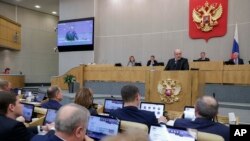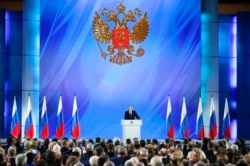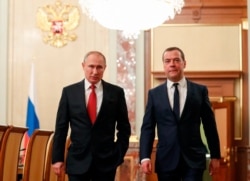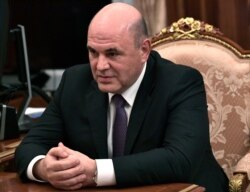Russian lawmakers have given their approval Thursday to President Vladimir Putin's choice of Mikhail Mishustin as the country's new prime minister.
The vote came after an extraordinary day in Kremlin politics Wednesday that saw Putin propose major constitutional amendments and accept the resignation of the government of his longtime prime minister, Dmitry Medvedev.
Medvedev submitted his Cabinet's resignation shortly after Putin proposed a series of constitutional changes aimed at strengthening the parliament at the expense of the presidency.
Putin later nominated Mishustin, 53, the head of Russia’s tax service for the past decade but little known to the public, to head Russia’s government.
Putin’s proposals for constitutional reform came during his annual address to the Federal Assembly — a yearly "state of the nation" style speech that appeared to lay the groundwork to preserve Putin’s influence over the country when his current and final presidential term ends in 2024.
Approval of the prime minister and other key Cabinet posts, Putin suggested in his speech, should soon lie with Russia’s Duma legislative body, which would now have “greater responsibility” in governing.
Putin also proposed that the State Council, currently an advisory group to the president, be constitutionally enshrined with formal authority.
"These are very serious changes to the political system," Putin said in outlining the proposals.
Medvedev appeared with Putin and his Cabinet within hours of the speech to announce his government was dissolving to reflect the shifting constitutional landscape.
"In this context, it’s obvious that we, as the government of the Russian Federation, should give the president of our country the possibility to take all necessary decisions under these conditions,” he said.
In turn, Putin thanked Medvedev for his efforts and appointed him to a new post as his deputy on the Security Council.
A Russia beyond Putin
The constitutional and government shakeup are the latest chapter in frenzied speculation over Putin’s future when his current and final term ends in 2024.
Constitutional amendments to ban term limits and a possible union with neighboring Belarus have been among theories widely debated as semi-legal solutions to keep Putin in power.
Yet, with Wednesday's speech proposing the neutering of the presidency, Putin appeared to hint at wielding power through new constitutional architecture — perhaps as a newly empowered prime minister or member of a more independent security council.
Either way, Kremlin critics argued the constitutional moves signaled Putin's intentions to remain on the national scene.
"Everyone was guessing: What would this thieving regime do to stay in power past 2024,” wrote the political satire account, Мысли Перзидент, or “Thoughts of the Prezident," on Twitter. “Well here we go.”
"What happened is what we all guessed: There will be no change in the power in 2024,” wrote liberal politician Dmitry Gudkov in a post to Facebook.
"Constitutional coups can also be legal,” he added.
Indeed, a separate proposed reform by Putin — that anyone running for president must live in Russia for at least 25 years — suggested the Russian leader had an eye on potential competitors for the Kremlin seat in 2024.
Russian businessman Mikhail Khodorkovsky, a one-time oligarch and rival of Putin’s who currently lives in exile, had said he was open to running for the post.
The amendment — once passed — would seemingly bar him from the election.
Guns and butter
Yet the vast majority of Putin’s address reflected Kremlin concerns over growing dissatisfaction in Russia’s regions over poor living standards.
"In society, there’s a definite demand for change,” the Russian leader said at the start of his speech, in acknowledging public anger.
Putin argued the biggest challenge facing Russia was poverty and “the low wages of a large part of our citizens and families.”
Putin outlined new efforts to reverse low birthrates as well as make improvements to child subsidy programs for families. He also ordered lawmakers to raise incomes and make improvements to health care and education.
Yet observers online mocked the split screen reality of Russia’s wealthy political elite — many sporting heavy tans after the winter holidays — applauding efforts to improve the lot of Russia’s neediest.
"In the hall sit billionaires with unlimited power, who for 20 years have run the country as they want and promise [and then applaud, as if it’s already done] to give hot meals to school children,” wrote @StalinGulag, a popular online critic of the Kremlin, in a post to Twitter.
Other government critics argued the desire to project change after 20 year was partially behind Medvedev’s resignation.
"They need to imitate big changes, social programs, concern about people, and an end to stagnation. To make it look like this time they’re serious,” wrote opposition politician Leonid Volkov, in a post on Facebook.
"It’s obvious the voters won’t buy it,” Volkov added.
Yet Putin also used the speech to tout Russia’s defense capabilities, noting that Russia had deployed several next generation nuclear weapons that were the envy of its global rivals.
"For the first time we’re not chasing anyone,” Putin said. “It’s now other governments of the world that are trying to develop weapons that Russia possesses.”
The line was met with sustained applause throughout the hall.







